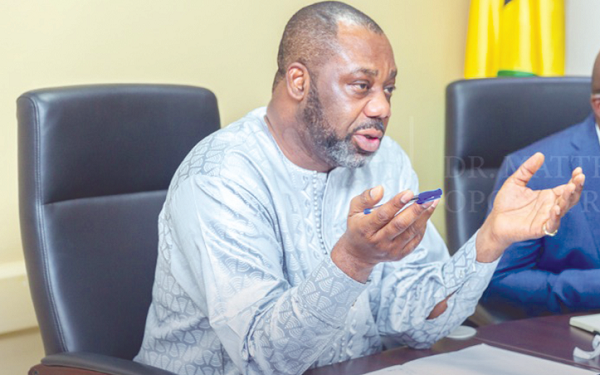With reports of a ministerial reshuffle and prediction of his exit from the Energy Ministry, the current Energy Minister, Mathew Opopu Prempeh alias “Napo”, has mounted praise singing campaign on social media and print media outlets to project him as the best minister for the job who must be retained by President Nana Akufo-Addo.
Many insiders, believe that Napo’s resistance and use of a key traditional ruler not to leave the energy ministry, is part of the reason the president is unable to reshuffle his ministers
Sources indicate that the temperamental Minister, has threatened to revolt against the government with two years left for the president, if he is taken away from the Energy Ministry.
The thought of becoming extremely unpopular, in the current severe economic hardship that has gotten many citizens apprehensive about their investment in government securities, has made the Jubilee House; the presidency, very jittery and cautious.
It does appear that Napo, has managed to attain untouchable status in the cabinet of Akufo-Addo after several misbehaviours in cabinet and before the president.
In 2021, Napo’s disregard of directives by the president to approve the sale of Anadarko assets to Kosmos, also created a duplicative standoff between Ghana and the United States.
Readers of this paper, will recall that after Kosmos negotiated the acquisition of Anardako Stake in Jubilee and Ten Oil fields, Napo, through Springfield, threw a wrench into the deal with a counter bid just when his approval was required.
The president was subsequently denied access to the White House when looking for vaccines to fulfill his pledge to the Ghanaian people against the COVID Pandemic.
The Jubilee House, had to promise White House approval of the Kosmos transaction before the United States Vice President, Kamala Harris received Mr Akufo-Addo.
Regardless of the presidential promise to the White House, Napo continued to defy the directive of the president to approve the transaction.
Napo boycotted the crisis midnight meeting at the presidency when Kosmos wrote to withdraw from the transaction- which meant Ghana would not receive the 1 million doses of vaccines promised by the US. He grudgingly had to sign the approval one early morning after the meeting when he picked the signal he could be sacked.
Insiders report many such situations, but Napo scaled them all. Cabinet ministers are used to his tantrums at meetings, according to a source in the cabinet. Foreign investors have also had concerns about his erratic outburst during meetings.
It appears likely that he will scale the reshuffle if it ever comes. Beyond his record of surviving the Akufo-Addo government, he has taken it a bit higher with high-powered lobbying and the media campaign, to further guarantee his place in the Energy Ministry. Those linking him to the Trade Ministry, should perhaps start revising their notes.
Anybody can be a minister, but at all times, his record must be stated with truth and integrity. The Herald, therefore, took the pain to confirm many of the claims in the media to prop up the image of Napo in the energy sector.
In the power sector, the minister has been an unmitigated disaster. All the projects he claims are verified as projects initiated and financed before he became a minister. Just as the NPP government continued, the transmission infrastructure commissioned by Napo was all started and funded under Mahama’s government. These include the Kumasi-Bolgatanga transmission line, Pokuase and Kasoa substation, and Achimot- Malam transmission line.
There is no new project started by Napo in the power sector. He has instead supervised unprecedented debt accumulation that has contributed to Ghana’s recent flirtation with the IMF. Between 2021 and 2022, when he has been the minister, the power sector debt grew by more than $4 billion, which had to be paid by the government. When he inaugurated a task force to recover ECG revenue, he taunted it as the silver bullet to save the utility. However, in that year, ECG made a loss of over a billion dollars.
Currently, the IPPs are owed about $1.3 billion for power generated and consumed. At the same time, governments owe about $346 million for gas consumed by the power sector.
Despite the dire situation of the power sector, he engaged in one of the most terrible negotiations the industry has seen.
Some of the sins Napo will leave with Ghana long after he departs the Energy Ministry, one insider retorted; “Deals like Genser will eventually destroy Ghana Gas, VRA and ECG. It is surprising that the government appears numb and clueless about the damage being done to Ghana by the sheer arrogance of Napo”.
Indeed, he was recently seen attacking the Ghana Gas CEO, Dr Ben Asante of the Genser deal which has led to the loss of hundreds of millions of dollars.
This week, it came out at the Public Accounts sitting that Bui Dam is owed US$600 million but ECG. Power was supplied but payment was not honoured the distributor.
He relieved Ameri of its duties to Ghana and re-awarded the power plant for relocation, US$10 million more than the asking price of the contractor. At the same time, the power plant was not fixed by Ameri as required by the contract.
Today, the power sector remains the single most significant threat to the country’s economic recovery. Under Napo, ECG revenues against commitments are wide apart. The minister doesn’t talk about these challenges but reliably holds on to achievements that would have happened without his intervention.
The story in the oil sector is far worse. Napo is the Minister to have supervised the sector’s decline every year since assuming the job as minister. The Herald’s checks at the ministry confirm how difficult it is to converse with the minister about field improvements and permitting. He has consistently interfered with the operation of the petroleum commission to decline approvals.
Last week he was exposed by the Executive Director of African Centre for Energy Policy (ACEP) at the Great Hall of University of Ghana. In a video published by the premier university, the energy minister is heard saying that he does not “grant approvals and permits; it is the Petroleum Commission’s Job”.
However, in the publications circulating to tout his achievement, the minister is credited with ENI’s approval of appraisal works. Interestingly, The Herald published a series of articles on how the minister was frustrating the company for approval to undertake appraisal. It took more than a year to approve the appraisal programme, contrary to the one month required by law.
Our information is that the Italian ENI wanted to do a fast tract development of block 4 and connect it to the FPSO John Agyekum Kufour. Napo’s refusal to engage the company made them shift attention to a subsequent discovery they made in neighbouring Ivory Coast, which will go into production before the end of March, this year. This means that if Napo had approved the Appraisal Programme, Ghana would have added to its oil production by now to generate the badly needed revenue for the comatose economy.
Under Napo, Ghana is in arbitration with the two oil producers, Tullow and Eni. Industry watchers attribute the low confidence in the upstream sector to his bullish behaviour and lack of understanding of how the oil industry works.
“Investors are increasingly disinterested in investing in the upstream sector”, another industry player lamented.
Sadly, he continues to fly around the world looking for investments. This paper has reported many trips to conferences abroad with some institutional heads under him, including those of Ghana National Petroleum Corporation (GNPC), which yielded no benefits to the state. The conferences have become political tourism for sponsored party foot soldiers and friends.
According to one insider in the ministry, “we have never seen a minister show so much interest in traveling like him. Former Ministers did not even participate in road shows. It was usually for technical people, but now the Minster’s followers are more than the technical team on investment trips”.
While the Minister travelled around looking for investors, he spent two years without concluding on competitive bidding initiated by his predecessors. He prefers direct negotiation for deal-making to open and transparent processes of awarding petroleum blocks. He recently wrote to terminate blocks won through competitive bidding and asked the companies to come for direct negotiation.
Aker energy, has attempted to exit Ghana under Napo. The Norwegian company was almost led into one of the most dubious transactions in the oil industry where oil discoveries acquired for US$100 million were almost sold to GNPC for US$1.6 billion.
The tenure of Napo at the Energy Ministry, has verifiable poor governance history that should not be swept under the carpet by praise singers. The country has been worse with him as the energy minister in all sub-sectors.
More to come!










Discussion about this post